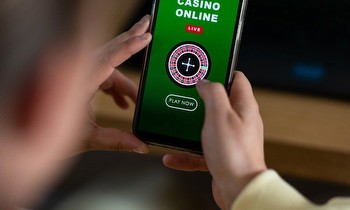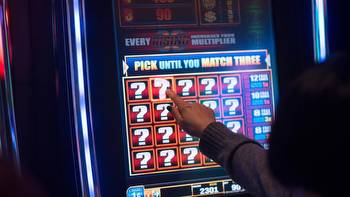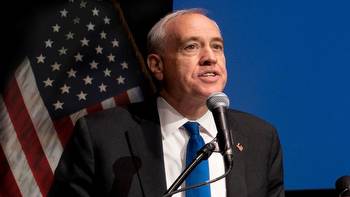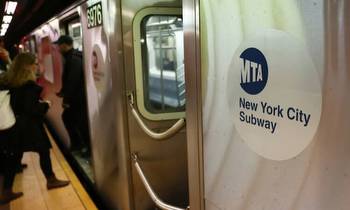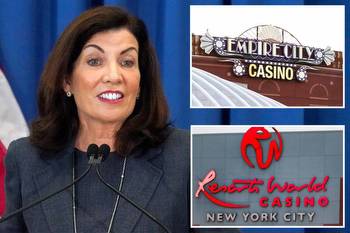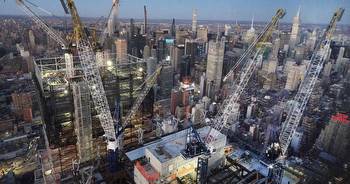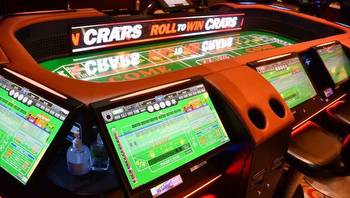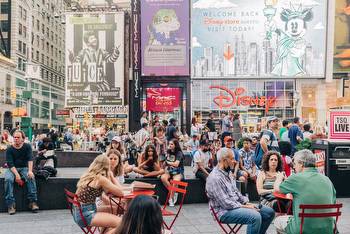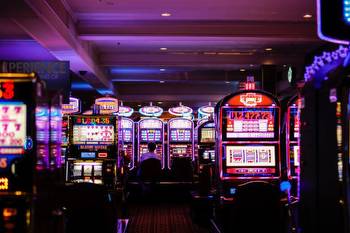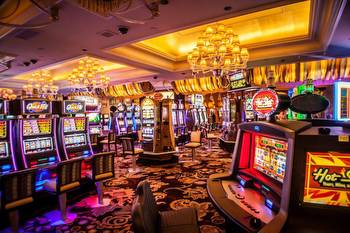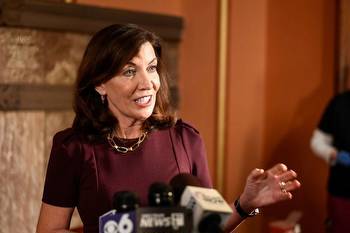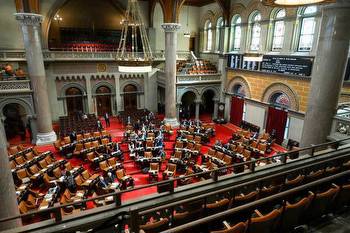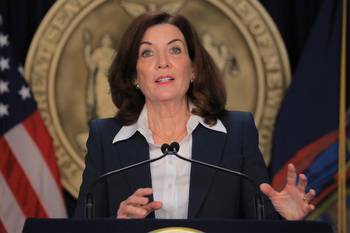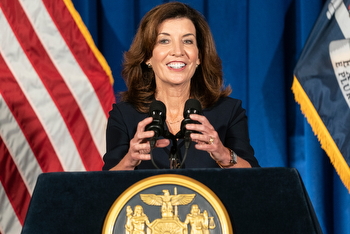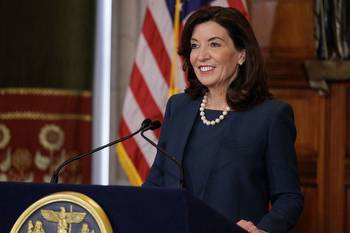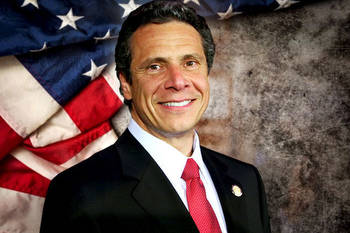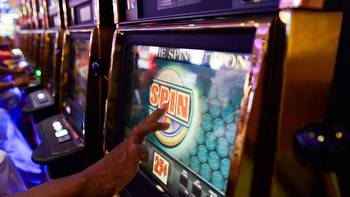Can Casinos Save The Big Apple? Don't Bet On It

Real estate developers, state politicians, and at least one prominent mayoral candidate believe that opening casinos in New York City could help address the state’s $15 billion budget crisis.
“If I can raise a billion dollars without raising a penny in taxes, I think that’s a good deal,” one Westchester lawmaker told the New York Times for a story that outlined competing visions for a state gambling expansion, from opening new casinos in Midtown Manhattan to allowing the existing racinos in Queens and Yonkers to broaden their offerings. There are also the eye-popping potential licensing fees that could produce huge one-time windfalls, and the creation of some good paying jobs, the argument goes.
But a look at the figures compiled across the state and the country show that even after putting aside their social costs, casinos are not a reliable way to generate significant and consistent amounts of money for state coffers.
“They generate revenues in the short-term but they are not sustainable in the long-term,” said Lucy Dadayan, a senior research associate with the Urban-Brookings Tax Policy Center at the Urban Institute, who has several reports on gaming.
“With the pandemic, we have seen so many dramatic shifts in how people consume services in the era where in-person activities are limited,” Dadayan said. “Building casinos in New York City right now is probably the least prudent policy.”
According to a recent report from State Comptroller Tom DiNapoli, all types of gaming in New York State generated nearly $3.7 billion in state tax revenue for the 2020 fiscal year, more than any other state in the country,
The vast majority of that total, $2.5 billion, came from lottery games you can play anywhere. The eight video lottery facilities (formerly known as “racinos,” which allow video gambling and horse betting) generated $944 million. Only 5.1% of the $3.7 billion total—$188 million—came from the four upstate commercial casinos, which have card games, roulette wheels, and slot machines.
“State revenue from the four new casinos has not come close to the projections the casino developers made in license applications to the Gaming Commission,” DiNapoli wrote in his report.
Governor Andrew Cuomo has advocated for a proposal to allow the state to oversee the introduction of mobile sports betting, which he projected would raise $500 million a year for the state. The governor’s office did not immediately respond to a request for comment.
Dadayan said that online sports betting has more potential for generating cash than casinos.
“We see based on limited evidence that online sports betting is attracting more attention, new customers, particularly more of a younger generation, and is showing growth in revenues generated,” Dadayan said. She added that in general, studies show that the people who spend money on gambling are “low-income taxpayers, low-income people.”
Mayoral candidate Andrew Yang recently pitched the idea of putting a casino on Governor’s Island to get pandemic-wary and travel-shy tourists back to New York.
“That casino would generate so much money it would be bananas,” Yang said. “If the city could get that in place and harness some of that — that would be one of the engines of recovery.”
Carl Davis, the research director at the left-leaning Institute on Taxation and Economic Policy, said that this is an outmoded way of looking at the market, given the overall saturation of casinos and gambling in the region.
“A couple decades ago states were viewing it as a way to raise money from out-of-state people,” Davis said. “Now that gambling is so widespread, most of the foot traffic is going to be coming from New Yorkers, spending [money] on gambling instead of something else.”
Dadayan's research showed that new casinos and racinos significantly eat into the business of existing operations. Pennsylvania's gambling operations hurt New Jersey's, while Ohio and Maryland's casinos affected business in Pennsylvania, and New York's racinos caused drops in revenue at venues in New Jersey and Pennsylvania.
Queens Assemblyman Ron Kim, an early supporter of Yang’s candidacy, said he opposed the idea of building new casinos to close the budget gap.
“When we have our next policy discussion, which is like, once a week, I plan on bringing this up and making sure we flesh it out and he understands that having a basic income solution with an economic development project that may extract a lot of that money out of our communities, is the last thing we need,” Kim said, referring to Yang’s “universal income” policy.
Kim is one of the Democratic state lawmakers who support raising taxes on very wealthy New Yorkers, including a controversial wealth tax on billionaires.
“It’s actually very healthy discussion for our voters and constituents, they need to see the full menu,” Kim posited. “Do you want to build more casinos, that would generate revenue from a more regressive tax structure, that relies on working families and upper middle class people to spend more money and consume more, to generate revenue? Or do you finally want to set a national tone that we will go after the ultra-wealth that has not been touched by taxes, ever, in the state of New York?”
A spokesperson for Yang wrote in an email that adding three New York City casinos would "accelerate the return of jobs and tourism to our city," and cited figures from casino lobbyists showing that they would generate an additional $1.5 billion in licensing fees and $900 million in annual revenue. Currently, the Resorts World racino in Queens accounts for around $300 million a year in revenue.
"We need an all of the above strategy to bring back our city—and we need to do it now," the spokesperson said.
The 2013 state law that ultimately granted the four casinos licenses to operate allows for three more licenses to be issued, but not until 2023. The state legislature could amend that law to speed up the process, but granting those licenses would still be up to the state’s Gaming Commission.
“It’s an easy solution politically,” Dadayan said, explaining the legislative appeal of using casinos to address budget deficits. “If they look into increasing tax rates on corporations or on income taxes, it’s hard to pass [these bills].”
Cuomo has said he would only support a new 2% tax increase on New Yorkers who earn more than $5 million annually if the federal government does not deliver the full $15 billion in aid that the state needs. That increase would raise $1.5 billion annually. Legislative leaders, however, have said that they want to pursue taxes on the wealthy no matter what.
“I wanted to make it clear that we are in a position to ask more of those who have more in addition to asking our federal government to step up,” State Senate Majority Leader Andrea Stewart-Cousins told WNYC’s Brian Lehrer on Thursday morning.
“We’ve seen with inequality getting worse and worse, progressive taxes, and taxes at the top can be very strong revenue raisers,” said Davis, the research director at the Institute on Taxation and Economic Policy. “With an income tax, you can very easily choose to make any new tax increase not apply to anybody who is suffering right now.”








